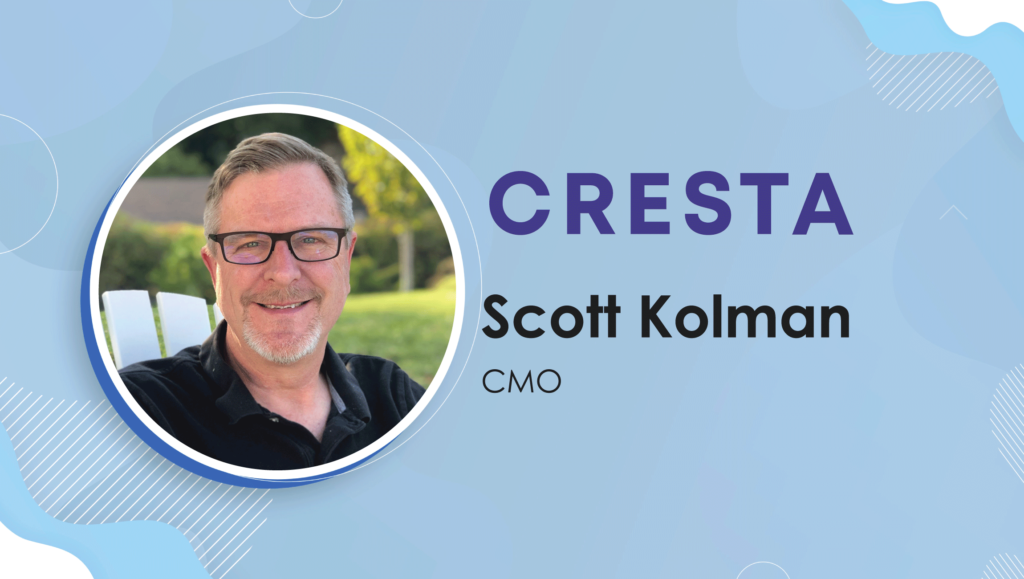Contact centers were primarily used to drive customer support goals but recent years have seen businesses using contact centers to impact actual sales journeys: Scott Kolman, CMO At Cresta comments on these changes:
___________
Welcome to this SalesTechStar chat Scott, tell us about yourself and your B2B journey, we’d love to hear about your role as CMO at Cresta.
I’m fortunate to have joined Cresta recently as CMO. Prior to joining Cresta, I spent the majority of my career in the contact center and customer experience space, including in leadership roles at Amdocs, Genesys, and most recently, Five9. The unifying elements of these roles was a focus on how to improve both the customer and agent experiences. I’m a believer in the tremendous value of contact center technology, and the incredible impact that AI in particular can have. AI has the power to transform the way organizations engage with customers and to help sales and service teams increase agent productivity and performance.
As CMO at Cresta, my focus is on helping to bring the solutions to market, and to articulate the value they deliver through customer stories and insights.
Cresta recently unveiled its inaugural sales report – we’d love some key insights/highlights from it.
In recent years, contact centers have increasingly been used to drive sales, so we surveyed 300 service and sales leaders to get a better understanding of their challenges and opportunities. Our “Sales Effectiveness in Revenue-Generating Contact Centers” report revealed several interesting findings.
Notably, the report revealed that while AI and real-time intelligence is on most leaders’ radar, it is still under-implemented, with only 35% of companies using the technology. Clearly, companies are aware of the value that AI can provide, but are somewhat slow to adopt it. This is likely due to some of the challenges that come with understanding what AI can do, especially with the recent hype around ChatGPT and new players in the AI space.
Interestingly, the study also found that bigger companies are often slower to innovate and embrace sales tools that measure efficiency and effectiveness. This is likely due to the sheer scale of these companies and the commitment that is required to implement and embrace new technology.
Finally, the report also found that 77% of respondents have a sales playbook, but only about half (55%) actually measure customer interactions against it.
All told, contact center usage for sales is on the rise, but there is still significant room for growth as companies evaluate and try to best understand the options that are available to them.
Read More: SalesTechStar Interview with Dan Green, Chief Revenue Officer at Semcasting
When it comes to the state of modern day sales and the use of salestech: how can sales leaders stay abreast while constantly improving how they onboard new tech and concurrently train teams to use them to the best of capabilities: what common lags do you find in this area?
To remain competitive in an ever-changing landscape, sales leaders must embrace new technologies, implement a well-researched AI strategy, and explore ways real-time intelligence can facilitate growth.
One insight that surprised us from our survey, was that the larger the company, the less mature their use of metrics to measure sales efficiency and effectiveness. While larger organizations may be well-positioned and resourced to be early adopters of emerging technologies, it’s also possible that change management at such scale may end up being more of a hindrance to nimble adaptation.
When weighing the benefits of implementing a new salestech platform, it’s vital that sales leaders take the appropriate time to properly research and determine their core KPIs. It’s common for businesses to rush to embrace technologies without properly researching what works best for their sales professionals and business.
It’s undeniable that these changes will be beneficial in the long-run, but it’s vital businesses make these shifts with proper research, metrics, and with their workforce in mind.
What are some of the key trends surrounding AI in Sales/SalesTech that you are following and what thoughts do you have for the future impact of AI across sales and customer facing roles?
As mentioned earlier, one of the biggest trends in the sales industry is the emerging role of contact centers as a sales mechanism – and AI is playing a greater role in contact center technology itself.
Traditionally, contact centers have been used for customer service inquiries. In the last decade, however, there have been some remarkable technology breakthroughs that have enabled organizations to raise the standard of customer service to new heights. Modern contact center technology uses AI and real-time natural language processing to analyze calls with customers, transcribe them in real time, and prompt agents on the best possible responses to customer inquiries. It can even analyze sentiment and tone of a conversation.
Recently, this same AI-powered technology is being used to help contact centers drive sales. Agents are prompted on the best responses that will encourage leads to convert. These prompts are based on the key behaviors a company has defined as part of their sales playbook that are proven to increase sales conversions and customer retention. Now, organizations can maximize the effectiveness of their contact centers beyond customer success, and also focus on activities that can help to improve revenue growth.
Read More: How Trust and Value Drive Purchasing Behavior in an Era of Inflation
Take us through some of the common B2B sales/marketing challenges you see sales/marketing leaders struggle with and what best practices you’d share?
Today, some of the primary challenges sales and marketing leaders face are coaching, training (including new agent onboarding), and engaging a remote workforce.
In a remote contact center for example, there is a lack of visibility across phone and chat interactions, inadequate coaching coverage, and a lack of agent support that has negatively impacted agents’ effectiveness and ongoing development. Much of this stems from the fact that in a remote work environment, managers no longer have physical, in-person access to sales agents. For effective virtual coaching, I recommend several tactics:
– Create and give all agents access to a virtual “war room,” allowing for active group discussions and problem-solving.
– Make subject matter experts (SME) available to more quickly answer product and process questions a manager would ordinarily address.
– Train and empower for autonomy by using collaboration software in defined situations.
– Provide managers and supervisors with the ability to “listen” to customer interactions in real time, and to step in to assist the agent as needed.
– Align agent and supervisor shifts so there is an overlap to foster direct communication.
– Provide more personalized, and timely, coaching of agents using insights directly from recent agent interactions with customers – focusing on key behaviors to reinforce to improve performance.”
By employing the above methods of virtual coaching, business leaders are able to engage their remote workforce and drive adoption/receptivity of AI technologies.
Can you highlight more about the future of the B2B tech market and in what ways you expect to see it grow?
At Cresta, we believe that generative AI can deliver efficiency and productivity by empowering sales professionals with tools and technology to augment everything they do – not replace them.
As organizations and sales leaders embrace and adopt artificial intelligence technologies, we’ll begin seeing tremendous growth in the B2B tech market. AI will enhance employee productivity, unify operations, improve customer experiences, and maximize sales potential.
Generative AI has the potential to redefine business performance and facilitate growth for many of today’s most successful companies in the B2B market – and the technology is only getting better and more refined.
Founded in 2017, Cresta is a real-time, AI-driven productivity platform that layers into any contact center environment and seamlessly works with existing systems to help agents, managers, and leaders drive greater revenue and efficiency, while enhancing customer experiences. By identifying productivity drivers, pinpointing areas for improvement, spotting industry trends, and tracking agent performance, leaders are able to put insights into action in real time and reduce time spent on individual coaching. Cresta’s advanced AI platform provides hints, reminders, and behavioral reinforcement to agents, enabling them to deliver a personalized experience across every customer interaction.
Scott Kolman is CMO at Cresta.
BONUS READ – Jon Miller, CMO at Demandbase chats about the evolution of ABM in this webchat with MarTechSeries:
Missed The Latest Episode of The SalesStar Podcast? Have a quick listen here!
Episode 170: Creating Connected Brand Experiences: with Jamie Adams, Chief Growth Officer at Scorpion
Episode 169: B2B Sales, Process Enhancements and Tips: with Sean Flynn, SVP of Global Sales at Avalara
Episode 168: AI and its Impact on Marketing and Sales with Marco Lagi, Vice President, Artificial Intelligence at Intentsify
















